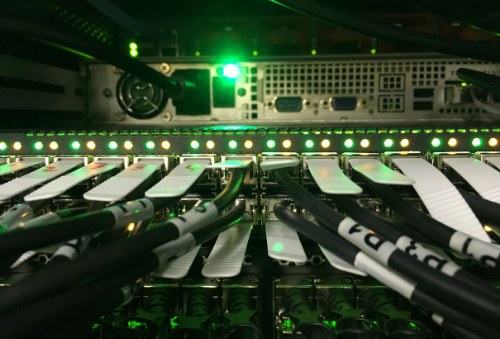CCNP ENCOR
Gain valuable skills and specialise in enterprise networking solutions
CCNP Enterprise - ENCOR
This course gives you the necessary knowledge and skills required to configure, implement, troubleshoot and manage wired and wireless networks in an enterprise environments. Also, you will learn how to overlay network design by using solutions such as SD-Access and SD-WAN.
Passing the CCNP Enterprise exam allows you to advance your career by moving onto more specialised roles, demand higher salaries and land more opportunities.

Advance your career with CCNP Enterprise
Overview
The latest Cisco Certified Network Professional Enterprise is the next step up from the CCNA certification. The CCNP course is an internationally recognised certification that is suitable for experienced networking professionals looking to advance their skills and work independently on complex network solutions.
The CCNP Enterprise is one of the most respected certification in the tech industry, which is demanded for Network Engineer, Network Specialists and Network consultant job roles. The new CCNP also includes automation and programmability that helps to scale your networking infrastructure.
To earn the CCNP Enterprise, students need to pass two exams, one that covers core enterprise network technologies and one concentration exam of your choice. This flexibility allows to customise your certification to your technical area of focus.
Target Audience
- Individuals seeking CCNP Enterprise
- Individual seeking CCIE certification
- Network Administrators
- Network Engineers
- 2nd/3rd-level network support staff
- System Engineers
Prerequisites
- CCNA or similar knowledge
- Basic understanding of Enterprise routing and wireless connectivity
Course Content
This course can help you gain the skills and knowledge necessary to perform tasks on personal computers hardware and operating systems such as:
- Explain the different principles used to create an enterprise network design
- Analyse design principles used for WLAN deployment
- Distinguish on-premises and cloud infrastructure deployments
- Explain the principles of the Cisco SD-WAN solution
- Explain the principles of the Cisco SD-Access solution
- Describe concepts of wireless and wired QoS
- Differentiate hardware and software mechanisms of switching
Virtualisation
- Describe various device virtualisation technologies
- Configure and verify data path (e.g. VRF, GRE) virtualisation technologies
- Describe concepts of network virtualisation
Infrastructure
- Describe multicast protocols, such as IGMP v2/v3 and PIM
- Describe modes of AP and types of antenna
- Describe AP discovery and join process (WLC selection process, discovery algorithms)
- Describe NTP (Network Time Protocol)
- Describe Layer 1 concepts of wireless, such as RF power, RSSI, SNR, bands and channels, interference and wireless client devices capabilities
- Configure and verify common Spanning Tree Protocols(STPs), such as RSTP and MST
- Configure and verify simple OSPF environments, including establishing neighbour adjacency, multiple normal areas, and passive interface)
- Configure and verify OSPF route filtering and summarisation
- Configure and verify different types of OSPF Networks (point-to-point and broadcast network)
- Configure and verify eBGP between connected routers (best path selection algorithm and neighbour relationships)
- Configure and verify NAT and PAT
- Configure FHRP (First Hop Redundancy Protocols (HSRP and VRRP)
- Troubleshoot 802.1q trunking protocols
- Troubleshoot EtherChannels for static and dynamic
- Troubleshoot issues of wireless client connectivity
- Compare EIGRP and OSPF in terms of advanced distance vector vs. linked state, path selection methods/algorithm, metrics and load balancing
Network Assurance
- Diagnose network problems by using various tools like SNMP, ping, traceroute, and debugging
- Configure and verify NetFlow, Flexible NetFlow and Syslog
- Configure and verify SPAN, RSPAN, and ERSPAN
- Configure and verify IPSLA
- Describe Cisco DNA Center workflows to apply network configuration, management and monitoring
- Configure and verify RESTCONF and NETCONF
Network Security
- Describe REST API security
- Describe the network security design components
- Configure and verify access control for devices
- Configure and verify elements of infrastructure security
- Configure and verify features of wireless security features
Automation
- Interpret basic components and scripts of Python
- Construct valid JSON encoded file
- Describe the high-level principles and benefits of a data modeling language
- Describe APIs for vManage and Cisco DNA Centre
- Explain REST API response codes and results in payload using Cisco DNA Center and RESTCONF
- Create EEM Applet to Automate configuration, troubleshooting
- Compare agent vs. agentless orchestration tools like SaltStack, Chef and Ansible
Our CCNP ENCOR Course Includes
- Free Lecture and Lab books
- Free access for the recorded lectures
- Free retake within 12 months
- Student mentor
- Career support
Candidates can achieve this certification by passing the following exam(s).
- Implementing and Operating Cisco Enterprise Network Core Technologies (ENCOR) – Exam 350-401
Coming soon.
Book Yours Now Cisco Course SCHEDULE
CCNA 200-301
12 Weeks, Once Per Week-
12 Weeks, Once Per Week
-
Sunday 2PM-5PM
-
In-Class @Whitechapel
-
GlobalNet Live Online
CCNP ENCOR
8 Weeks, Once Per Week-
8 Weeks, Once Per Week
-
Saturday 10AM-1PM
-
In-Class @Whitechapel/Stonebridge
-
GlobalNet Live Online
Related Courses
CCNP Enterprise (ENARSI)
The ENARSI gives you the knowledge to install, configure, maintain, operate and troubleshoot an enterprise network.
CCNA 200-301
The CCNA course covers broad range of fundamental knowledge essential for all IT careers and different learning paths.
Architecting on AWS
This course teaches you how to design cloud architectures from small to large-scale including computer, storage, database, network and security.



